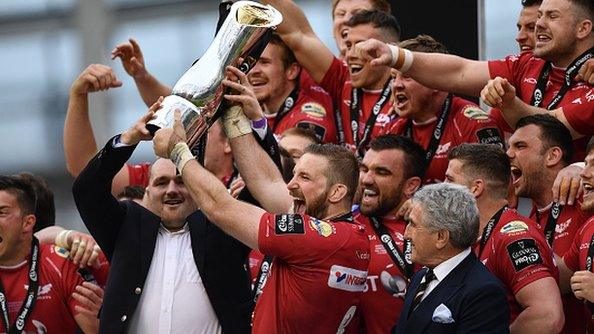Glasgow Warriors' Dave Rennie out to match winning culture he had at Chiefs
- Published
Glasgow Warriors: Dave Rennie aims to boost culture at Warriors
To get a proper angle on what Dave Rennie achieved at the Chiefs in his native New Zealand, all you have to do is take a look at the local press from the week it was announced their coach was committing himself to Glasgow Warriors.
There was practically a black border around the newspapers of Hamilton when the news broke. There were eulogies from current and past players. Local rugby historians wrote think pieces reminding everybody, not that they needed reminding, of what life was like before Rennie brought entertainment and success into their world.
There had been 16 years of Super Rugby before he arrived and the Chiefs had made only made one semi-final, in 2004, before reaching their one final, which they lost 61-17 to the Bulls in 2009. In 2010, the Chiefs finished 10th, in 2011, they finished 10th again.
Having coached New Zealand to three straight Junior World Cup titles in 2008, 2009 and 2010, Rennie went to the Chiefs in 2012 and won Super Rugby at the first attempt. Then he won it again. In the opinion of the Hamilton media, Rennie was a Messiah, the greatest redeemer they had ever known.
Now Rennie is in a different place; Scotstoun by day and a home in the shadow of Stirling's Wallace Monument by night. As a coach, he talks a lot about culture.
In that sense, he's in the right place. From his back garden, with the Castle in the distance, there's centuries of history just staring him in the face and, when the time comes, a desire to immerse himself in it.
Rennie's rebuild of the Chiefs was both swift and sparkling, on and off the park. These are early days for him in Glasgow, so it's by studying his work in Hamilton that we begin to understand him.
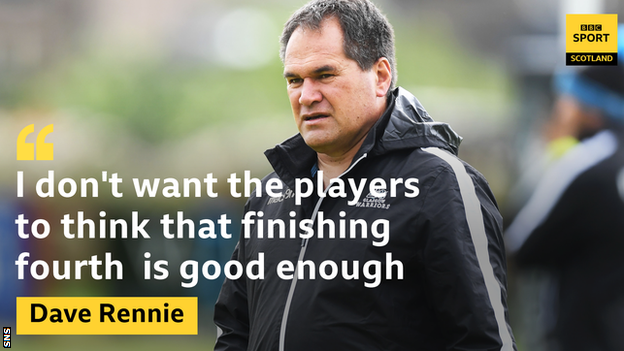
Rennie immediately set his sights on the inaugural Pro14 title
"Fortunately, there was a big chunk of guys who were leaving the club, so we could change the culture and we worked really hard to try to get a connection with the people," he says, on the key steps to glory. "We learned a lot about the history of our region through genuine engagement.
"I think it made a difference. I wanted a group of guys who would work hard for each other and if people saw that then they would respect it and get behind us.
"Glasgow is a club that understands culture, understands how important it is to win respect in our community. By doing that, you need to get out and connect with people and give a little back.
"It needs to be genuine. More than an autograph and a handshake. Our boys are great at that. There's a lot of good players and good men here.
"We're only a short time in this game and we can make a real difference. My opinion is that a lot of professional sports teams will put a lot of emphasis on the technical and the tactical, but they don't drive the culture side of things.
Aaron Cruden, former Chiefs and New Zealand fly-half, talking to BBC Scotland |
|---|
"He [Rennie] was just always able, regardless of what team it was and what personnel he had, to create good habits and winning cultures. When you are able to produce that sort of culture, it just gains momentum every time you go out there and train or play. |
"I think that is because he really cares about his players - he gets to know them as people as well as rugby players, and when you've got a coach like that, you just feel really secure in the fact you know you're going out there for more than just yourself." |
"If you look across any competition, everyone has good players, so what makes the difference? My opinion would be that the work we do in the community makes us play better on Saturdays because we are playing for something bigger than ourselves.
Pro14: Dave Rennie cautious of expansions following Super Rugby experiences
"An example would be if we are doing work with charities. If you spend a bit of time with some sick kids and you see they've got a big smile on their face and they're happy to see you, you realise how brave and strong and courageous these kids are.
"The only way you can honour that is to show the same courage and strength on the weekend. Our connection with our people makes us play better. We have a club here that really understands that."
Rennie is part rugby coach, part preacher. The queue of world-class players who have been coached by him and who would readily walk over hot coals for him is as long as Sauchiehall Street.
At the Chiefs, his main leaders were Sam Cane, Brodie Retallick, Tawera Kerr-Barlow and the player he worked with the longest and who he freely admits he looks on as a son, Aaron Cruden. The second wave of leaders were Liam Messam, Stephen Donald and Michael Leitch.
All told, that's 293 Test caps between them. Rennie put together a powerhouse of standard-bearers.
Pro14 highlights: Glasgow Warriors 31-10 Ospreys
"We just wanted to make sure we had players who could drive things from within rather than having us old fellas doing all the yelling and screaming," he recalls. "Aaron was my captain and we're very close.
"It was like a father and son thing at the Chiefs. The boys used to tease him. They'd say I was his dad.
"He's a special character, a phenomenal rugby brain, very tough on himself, very tough on others, very professional. He's at Montpellier now [Glasgow have been drawn with Vern Cotter's team in Europe this season] and he'll be keen to make things happen. He certainly won't be over here just to pick up a cheque."
"Peter Horne has a similar personality to Aaron. He's very professional, he's prepared to poke guys in the chest and challenge them if he thinks they're not doing the right thing and it's not always easy to do that in this environment."
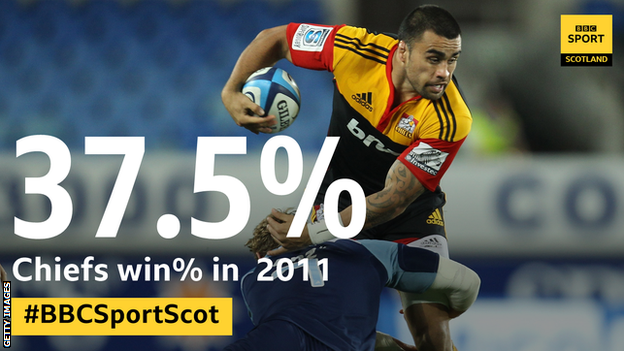
The Chiefs won only six of their 16 Super Rugby matches the year before Rennie took charge
Rennie is still getting to know his squad, but he likes what he sees, both in the established players and the ones coming through. He's added to the group in a substantial way.
Last season, Glasgow got stymied by international call-ups. This time, with more non-Scots and some young Scots on the periphery, they should be able to cope with the exodus a whole lot better.
When he agreed to join Warriors, it was the Pro12, now it's the Pro14 and with that change comes a little warning from a man who has just left the troubled waters of Super Rugby, a competition that started with 12 teams in 1996 then grew to 14 teams in 2006, 15 teams in 2011 and 18 teams in 2016. Amid rancour and legal action, those numbers are being scaled back now.
"You've got to tread carefully is what I would say," says Rennie. "When I first got involved, it was very strong. It's a different game now. We're bringing in teams that aren't as strong and the competition is being watered down.
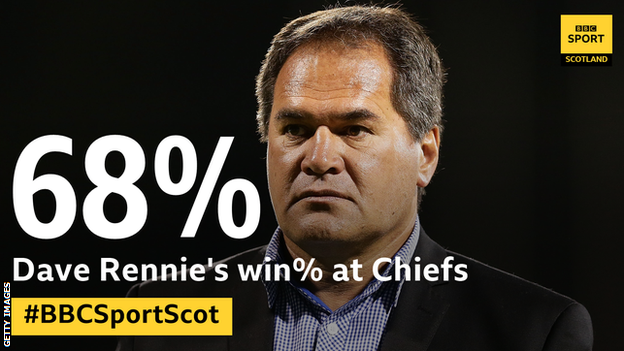
The Chiefs won 71 of their 104 Super Rugby matches in Rennie's six years as head coach
"It's an imbalanced competition. I would hate to see that happen here. The Pro12 is a hell of a lot stronger than the average Kiwi gives it credit for.
"They probably don't watch a hell of a lot of it, but there's some outstanding players here. A couple of South African sides coming in is pretty exciting, but the Kings have lost a lot of their players, so they're not the side they were in Super Rugby.
"We have to make sure what comes in is really adding to the competition and making it more competitive and that it's not just about growing the pot."
In a few months, New Zealand play Scotland at Murrayfield, a Test match that will have some amount of players who are being coached, or have been coached in the past, by Rennie.
"The biggest difference between New Zealand rugby and the rest of the world is not the backs, even though the All Blacks have some great backs," he suggests. "There are fantastic backs all around the world and I look over here and there are some great loose forwards, as good as anything New Zealand can churn out.
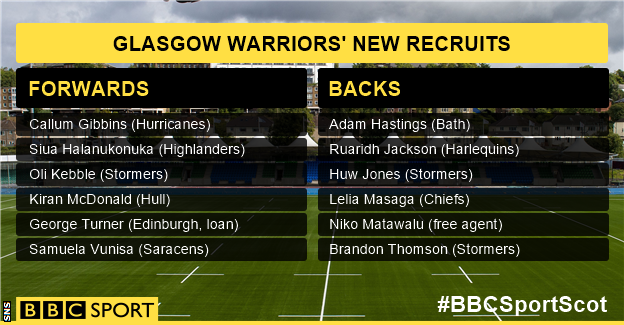
Rennie has made 12 senior signings since taking over
"Often the difference is in the tight-five. Not from a set-piece point of view but in the rest of the game. It's around skill-set.
"The All Blacks tend to have big men who have great footwork and great hands, so you have numbers 1-15 who can get the ball out of the hands under pressure and get in behind and offload. I reckon that's the significant difference. You have a lot of big men over here who are good at carrying and don't give a hell of a lot beyond that.
"That's something we've talked about here with our forwards. If we want to play a more expansive game, we need our big men handling better and having the footwork to get in behind defences and keep ball alive.
"We don't want a wall of defenders all over our backs each weekend. Glasgow have always played a fast game. We want to play it even faster. We want to have a brutality about what we do."
Rennie created a glorious rugby machine at the Chiefs, an attacking side that defied the natural order of things in New Zealand rugby. His work in trying to repeat the trick with Glasgow will be enthralling.
- Published8 September 2017
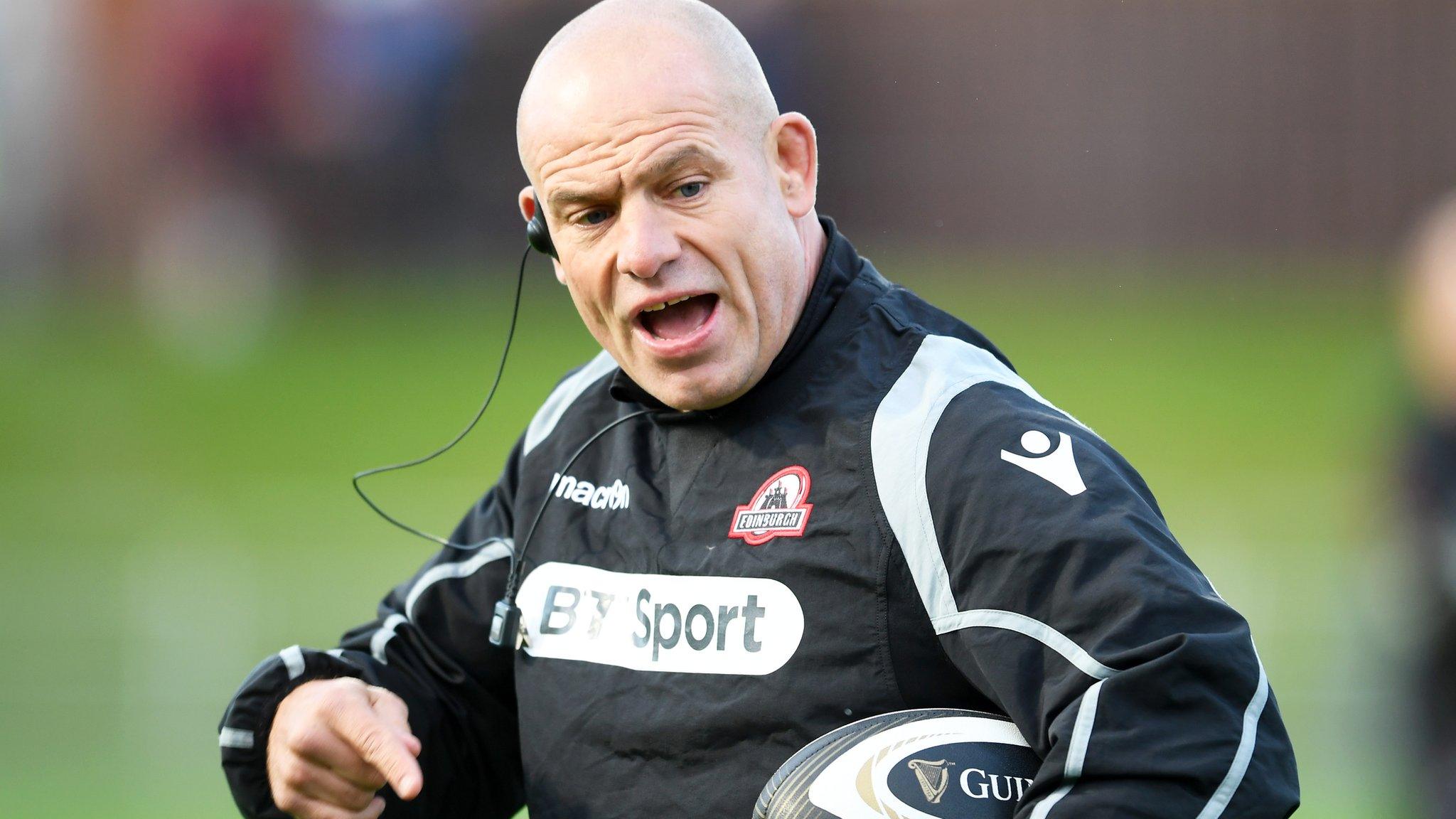
- Published8 September 2017
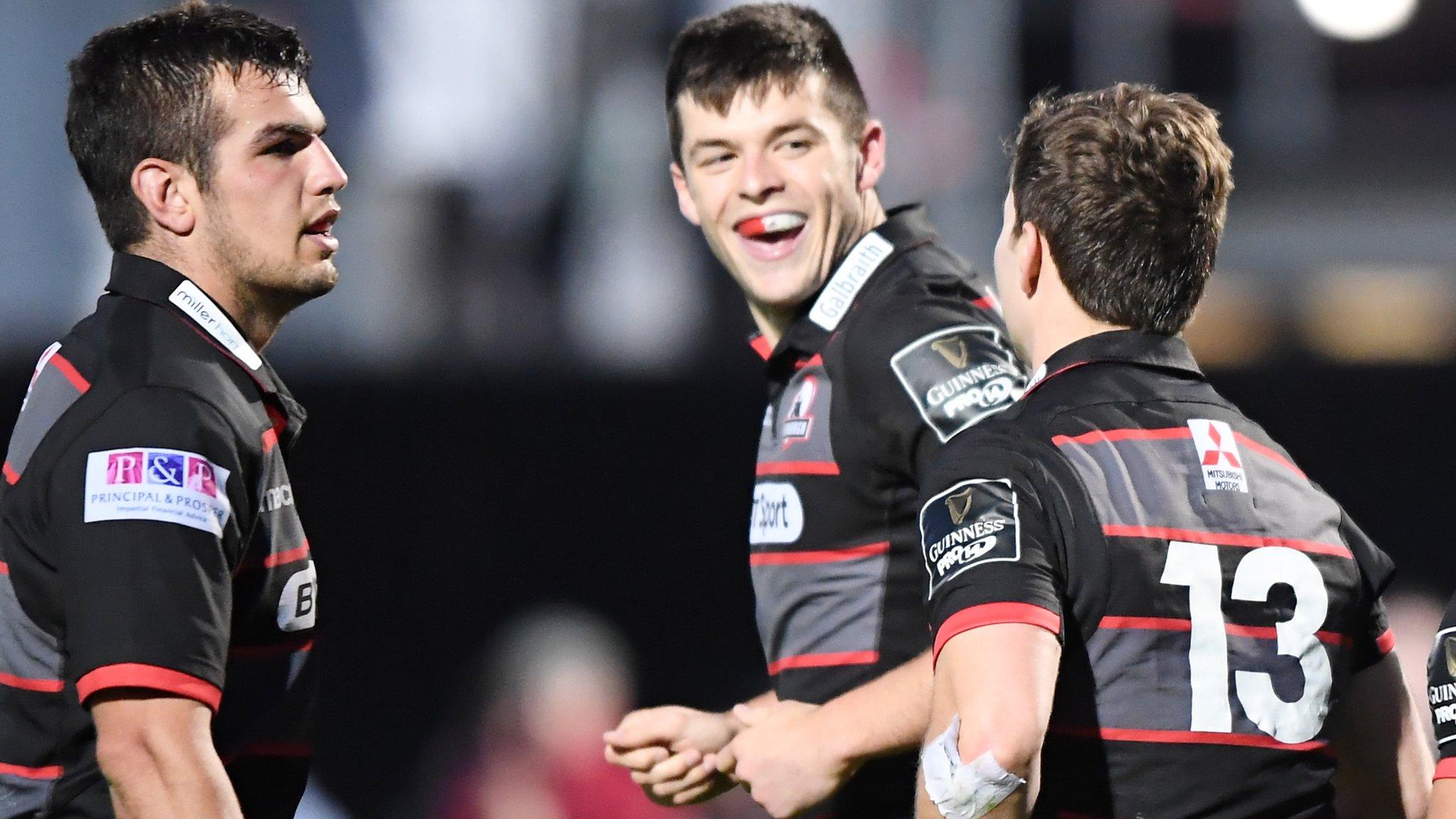
- Published30 August 2017
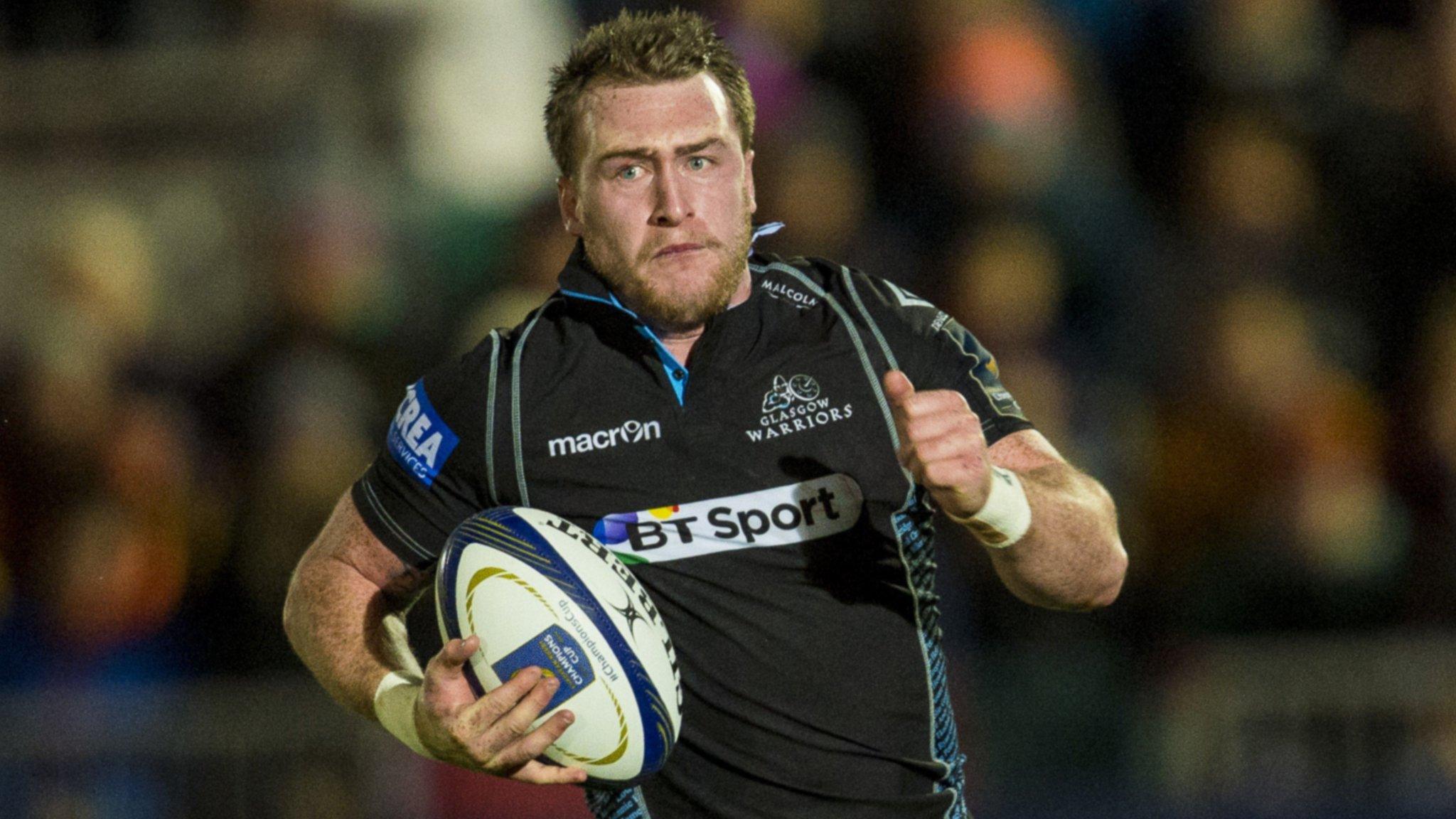
- Published30 August 2017
